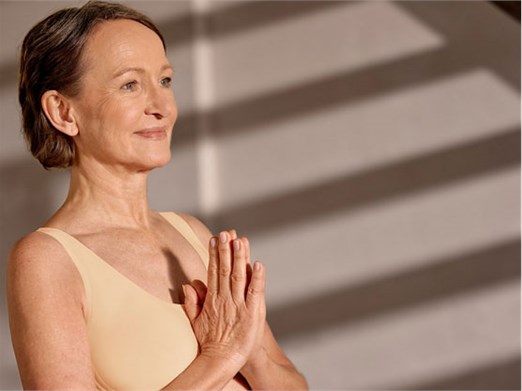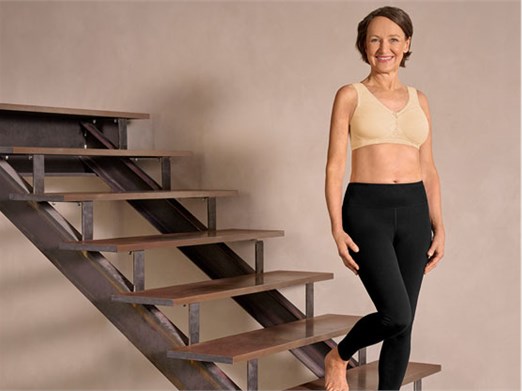Genetics and Family History
If you carry the BRCA genetic mutation, there's a support group you should know about
#UnBRCAble: The positive influence of BRCAStrong
If you're on Instagram and in any way connected to the breast cancer community, you probably already know about BRCAStrong. We're here to tell you anyway: This is a group doing monumentally good work for women who need support during the journey.
 The term "BRCA" has been around since the 1990s -- it refers to a genetic mutation (BReast CAncer genes) that's linked to a higher risk of breast and ovarian cancers. When Tracy Milgram was told she carried the BRCA2 mutation, she wanted to help others in her situation, so she founded the non-profit. Since then, it has grown to include not only genetically-predisposed women, but previvors, survivors and thrivers regardless of predisposition. "When I started BRCAStrong in 2015 I didn't imagine it would be this influential," Milgram admits. "Over the past 6 years I have seen the growth but now we've taken a great leap."
The term "BRCA" has been around since the 1990s -- it refers to a genetic mutation (BReast CAncer genes) that's linked to a higher risk of breast and ovarian cancers. When Tracy Milgram was told she carried the BRCA2 mutation, she wanted to help others in her situation, so she founded the non-profit. Since then, it has grown to include not only genetically-predisposed women, but previvors, survivors and thrivers regardless of predisposition. "When I started BRCAStrong in 2015 I didn't imagine it would be this influential," Milgram admits. "Over the past 6 years I have seen the growth but now we've taken a great leap."
Finding Each Other
A big presence on social media channels has significantly boosted their reach. Previvor Cara Cappello can attest to that: "I was going through my journey alone in Rochester, NY, and I found it incredibly difficult. There were no resources available for previvors like myself in my community. It felt very isolating... Through a Instagram search for #previvor, Tracy popped up on my feed. I loved her approach to empowering women," she recalls.
BRCAStrong supports all women in any stage of the breast cancer journey in many different ways, from pre-mastectomy care kits provided at no cost, to an active blog with testimonials, to live events on Instagram. Thrivers all over the world can find each other, and they do.
 Cappello stresses it's especially important for previvors to connect. "Our journey is different. We don’t have cancer. A lot of women who are diagnosed with a high risk choose to have a prophylactic mastectomy to reduce their risk of developing breast cancer. Other women choose to do high surveillance screenings every year for the rest of their lives in hopes to catch it early. The choice is a personal decision. Women who choose the mastectomy to reduce their risk make a very brave decision. It is a body-altering choice that forever changes you mentally, emotionally and physically."
Cappello stresses it's especially important for previvors to connect. "Our journey is different. We don’t have cancer. A lot of women who are diagnosed with a high risk choose to have a prophylactic mastectomy to reduce their risk of developing breast cancer. Other women choose to do high surveillance screenings every year for the rest of their lives in hopes to catch it early. The choice is a personal decision. Women who choose the mastectomy to reduce their risk make a very brave decision. It is a body-altering choice that forever changes you mentally, emotionally and physically."
Milgram says that's where the "UnBRCAble" hashtag comes from. "What makes previvors unique is we were able to take preventative action, and be one step ahead of cancer."
BRCAStrong Has Big Plans for the Future
The future holds much more than just online presence, Milgram says. "We have a transformational photo shoot coming up called Dear Body. Dear Body is a unique look at the advice you would give your younger self; we write your story on your back or on your body," she shares.
Other events are in the works, as well, including in-person meet-ups. Cappello knows it's making a difference. In fact, BRCAStrong inspired her to create her own local support group, as well, Breast PrevivorsROC. "We were both inspired by each other’s desire to advocate, support and empower other women in the community."
For more info about genetics and breast cancer, read on. You can also read our article about genetic testing with J-Screen.
Breast cancer genes and families
You may wonder exactly how breast cancer can be passed from generation to generation. Genetic inheritance of diseases, or anything else, is extremely complex. In general, genetic traits, like eye color or susceptibility to certain diseases, are passed from parents to children through their DNA. DNA is a long chain of molecules containing the codes for a person’s inherited traits. Children get one set of DNA from their mother and one from their father. In the specific case of breast cancer inheritance, this means that if a person’s mother or father has breast cancer in the family, s/he is at a higher risk of getting it.
Researchers discovered in the 1990s that specific genes, which are parts of the DNA chains, are linked to higher risk for breast cancer if they are altered, or damaged in certain ways. BRCA-1 and BRCA-2 are two of these genes. Children who inherit the altered, or high-risk, variants of these genes from their parents have a higher chance of developing breast cancer than people without them.
Here are some facts about inheriting the high-risk variants of the BRCA-1 or BRCA-2 genes:
- The high-risk variants are found in less than 0.5% of the general population and account for only about 5-10% of all breast cancer cases, and possibly fewer.
- A person with a family history of breast cancer has a higher chance of having a high-risk variant, but does not necessarily have one.
- A woman with one of the high-risk variants has an 80% chance of developing breast cancer before age 70.
- The high-risk variants are more common among Ashkenazi Jews than other populations. They are found in 2.5% of all members of this group and account for over 25% of breast cancer cases diagnosed before age 40 in the group.
Given this information, some women with a family history of breast cancer may decide to undergo genetic testing to discover whether they carry the high-risk variants of cancer-causing genes. With early discovery, a woman may be able to make lifestyle changes or undergo treatments to reduce her risk of developing breast cancer in the future.
Visit the websites listed here for more information on the genetic basis of breast cancer and genetic testing for the disease.
www.cancer.gov
This is the general site of the National Cancer Institute with links to many informative articles on genetics and breast cancer and on other aspects of the disease.
www.natlbcc.org
Information from the National Breast Cancer Coalition on the considerations and risks involved in genetic testing.
www.facingourrisk.org
The site of a nonprofit organization called FORCE--Facing Our Risk of Cancer Empowered--for women who know they are at a higher risk for breast cancer or who are wondering whether they face such a risk.
www.nsgc.org
The site of the National Society of Genetic Counselors provides some information on what to expect at your first meeting with a genetic counselor as well as a resource page for finding a counselor in your area who is a member of the society.








